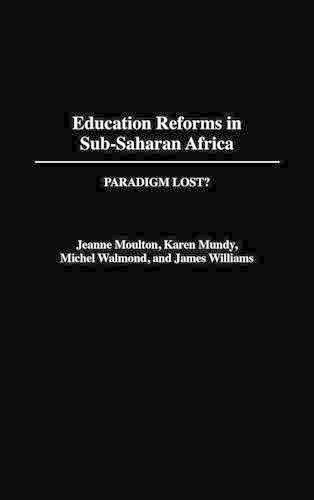
Education Reforms in Sub-Saharan Africa: Paradigm Lost
(Hardback)
Publishing Details
Education Reforms in Sub-Saharan Africa: Paradigm Lost
By (Author) Jeanne Moulton
By (author) Karen Mundy
Edited by Michel Welmond
Edited by James Williams
Bloomsbury Publishing PLC
Praeger Publishers Inc
30th December 2002
United States
Classifications
Tertiary Education
Non Fiction
370.967
Physical Properties
Hardback
248
Description
Looks at the new educational reform movement that began in the late 1980s in sub-Saharan Africa, after a World Bank policy study documented that African educational systems had entered a period of severe decline as a result of intensifying economic and political instability. The authors of this volume describe the efforts made in the last decade of the 20th century to reform African education, the goal of which was to achieve "education for all." In a series of five case studies, the politics surrounding the planning and implementation of these reforms are considered, and their outcomes analyzed. The countries considered are Benin, Ethiopia, Guinea, Malawi, and Uganda. Although the reforms are still underway, the book covers at least their first five years, bringing together facts and judgments into coherent stories. The authors present some conclusions about the implementation of basic education reforms that deserve serious consideration by policymakers, planners, and program managers. Have our assumptions about the process of reform been correct Have we selected the policy instruments most suitable for use in implementing various policies and programs What should we do to change the course of reform as we continue
Reviews
[B]rings empirical evidence from five country case studies-in Malawi, Uganda, Berlin, Guinea, and Ethiopia-to examine how an emergent paradigm of education reform has been designed, debated and implemented across sub-Saharan countries....The book examines in what way has the paradigm proven useful, and what are it's shortcomings.-Oxfam's Development Resource Review
[P]rovides a good background and analysis of policy reform and implementation in the countries studied. Practitioners who wish to gain greater understanding of the educational systems of Benin, Ethiopia, Guinea, Malawi, and Uganda could use it for university courses as well.-Comparative Education Review
"Brings empirical evidence from five country case studies-in Malawi, Uganda, Berlin, Guinea, and Ethiopia-to examine how an emergent paradigm of education reform has been designed, debated and implemented across sub-Saharan countries....The book examines in what way has the paradigm proven useful, and what are it's shortcomings."-Oxfam's Development Resource Review
"Provides a good background and analysis of policy reform and implementation in the countries studied. Practitioners who wish to gain greater understanding of the educational systems of Benin, Ethiopia, Guinea, Malawi, and Uganda could use it for university courses as well."-Comparative Education Review
"[P]rovides a good background and analysis of policy reform and implementation in the countries studied. Practitioners who wish to gain greater understanding of the educational systems of Benin, Ethiopia, Guinea, Malawi, and Uganda could use it for university courses as well."-Comparative Education Review
"[B]rings empirical evidence from five country case studies-in Malawi, Uganda, Berlin, Guinea, and Ethiopia-to examine how an emergent paradigm of education reform has been designed, debated and implemented across sub-Saharan countries....The book examines in what way has the paradigm proven useful, and what are it's shortcomings."-Oxfam's Development Resource Review
Author Bio
JEANNE MOULTON is a consultant in international education in Palo Alto, California. KAREN MUNDY is Assistant Professor, Social Sciences, Policy, and Educational Practice, Stanford University School of Education. MICHEL WELMOND is Research Educational Analyst, Center for International Development, Research Triangle Institute in North Carolina. JAMES H. WILLIAMS is Assistant Professor of International Education, Department of Educational Leadership, George Washington University.
